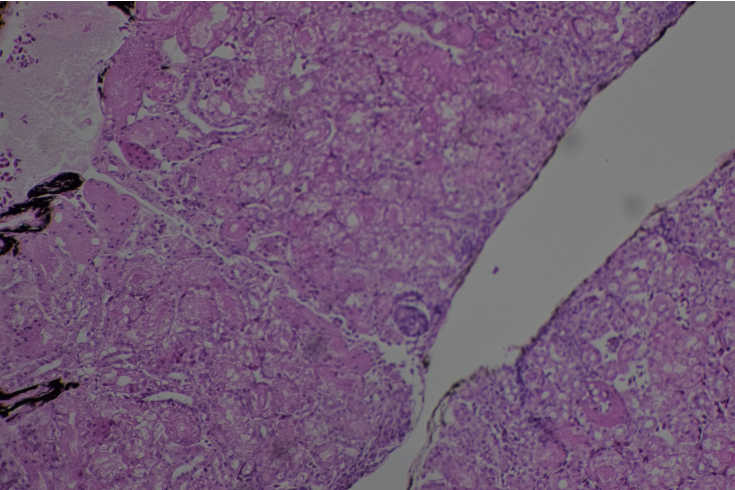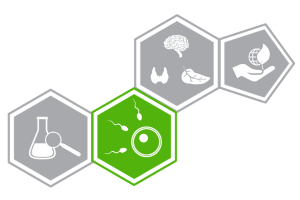
THEME 2

DISRUPTION OF THE REPRODUCTIVE AXIS
Thematic Leader: Géraldine Delbès
The objective of this theme is to determine the regulatory mechanisms underlying the reproductive effects induced by endocrine disruptors. Research on the reproductive axis disruption includes the development of rapid and effective models for the detection of potential endocrine disruptors with a focus on cell-based models representing the male and female reproductive systems. It also includes models related to hormones (steroids, neuroendocrine secretion) to test the reproductive potential of endocrine disruptors. The expertise covers both aquatic and terrestrial species, from invertebrates to mammals.
GÉRALDINE DELBÈS’ BIOGRAPHY
The objective of Dr. Geraldine Delbès’ research is to study the impact of environmental compounds and chemotherapy drugs on immature male germ cells and the long-term consequences on adult male fertility. Her research aims to understand how environmental and therapeutic chemicals can affect the programming of male germ cells and have long-term consequences on spermatogenesis. Using in vivo and in vitro models in rodents and humans, her research team studies cellular and molecular responses to endocrine disruptors and anti-cancer drugs, and evaluates epigenome, gene expression, damage to the DNA and oxidative stress.
Her work has involved collaborations with research networks in Canada, Europe and Tunisia and has resulted in more than 25 publications in peer-reviewed journals and books, as well as more than 50 presentations at national and international meetings.
REGULAR MEMBERS CONTRIBUTING TO THEME 2
Toxicology of Mixtures. Chemical Carcinogenesis. Risk Assessment. Learn more
Genomics, Genetic Toxicology, Hereditary Mutation, Development and Validation of Biomarkers, Adverse Effects Pathway. Learn more
Toxicology of Pregnancy and Implication of Environmental Factors on the Human Placenta and Fetal Programming. Learn more
Distribution and Toxic Effects of Contaminants in the Environment. Learn more
Environmental and Human Toxicology. Molecular Toxicology. Environmental Sciences. Neurodegeneration. Neurotoxicology. Learn more
Invasive Species. Stress. Ectotherm. Metabolomics. Chromatography (GC-MS, LC-MS). Learn more
Ecotoxicology. Olfaction. Pollutants. Insects. Adaptation. Ecophysiology. Insect Endocrinology. Learn more
Toxicology. Molecular Biology. Public and Environmental Health. Community-Based Research. Exposure Assessment and Biomonitoring. Learn more
Gene Expression. Aquatic Contaminants. Learn more
Endocrinology and Nephrology. Steroid Hormones. Hormone-Sensitive Cancers. Learn more
Molecular Ecotoxicology. Aquatic Nanotoxicology. Learn more
Aquatic Ecotoxicology. Environmental Effects Research. Wastewater. Agriculture. Cumulative Effects Assessment. Learn more
Reproductive Toxicology.
Toxicity of Environmental and Medical Substances on the Development of Male Germ Cells. Learn more
Ecotoxicology. Assessment of the Reproductive Capacity of Fish. Learn more
Environmental Toxicology. Toxicology, Breast Cancer and the Development of the Mammary Glands. Learn more
Ecotoxicology. Comparative Physiology of Metabolism. Metabolic Disease. Inter- and Trans-Generational Effects. Hormones in the Context of Comparative Epigenetics Including Post-Transcriptional Regulatory Mechanisms. Learn more
Epidemiology. Developmental Biology. Biomarker Design and Analysis. Learn more
Ecotoxicology. Molecular Biology. Environmental Risk Assessment. Learn more
Development of Fish Bioassays for Reproductive and Endocrine Effects. Environmental Risk Assessments. Learn more
Ecotoxicology. Molecular Toxicology. Predictive Toxicology. Species Extrapolation. Ecological Risk Assessment. Learn more
Environmental Toxicology. Comparative Avian Toxicology. Learn more
Molecular Biology and Biotechnology. Reproductive Physiology of Fish. Learn more
Ecosystem Health Assessment. Learn more
Ecotoxicology. Learn more
Hazard Assessment. Developmental Biology. Endocrinology. Learn more
Aquatic Ecotoxicology. Environmental Health. Environmental Contamination. Environmental Risk Assessment. Sex and Gender in the Environment. Environmental Hypersensitivity. Environmental Education. Learn more
Environmental Health and Ecohealth Approach. Water, Environment and Health. Political Ecology. Public Policies and Scientific and Social Evaluation Systems. Agrifood Systems and Pesticides. Environmental Sciences, Major Risks and Sociology. Learn more
Distribution, Bioaccumulation and Effects of Chemicals on Aquatic Organisms. Learn more
Epidemiology of Cancer.
Prostate Cancer. Environmental Exposures. Learn more
Aquatic Toxicology. Fish Reproductive Health. Environmental Effects Monitoring. Wastewater. Cumulative Effects Assessment. Learn more
Investigation of Biological Effects of Environmental Stressors. Environmental Risk Assessment. Development and Application of Bioanalytical Techniques to Assess Environmental Pollution. Aquatic Ecology/Fish Biology. Learn more
Environmental Epidemiology. Environmental Health. Reproductive Health. Toxicological Risk Analysis. Potable Water. Persistent Organic Pollutants. Metals. Pesticides. Learn more
Molecular Cloning. Cell Culture. Electrophoresis. Sexual Differentiation. Gene Expression. Molecular Biology. Endocrinology. Genetic. Physiology. Fish. Learn more
Toxicology. Reproductive Biology. Molecular Toxicology. Reproductive Health. Thyroid. Gene Expression. Environmental Toxicology. Risk Assessment. Learn more
Aquatic Toxicology. Gene Expression. Molecular Biology. Endocrinology. Biotechnology. Learn more
Environmental and Human Toxicology. in vitro Bioassays. Environment-Immune Interactions in Disease Susceptibility. Nutritional Toxicology. Learn more
Animal Biology and Genetics. Physiology of Reproduction and Behavior. Learn more
Aquatic Ecotoxicology. Molecular Biology. Learn more
Behavioural Neuroscience in Rodents. Hormones. Metabolism. Parental Experience. Environment, Adult Neurogenesis and Plasticity. Aging, Learning and Memory. Learn more
Developmental and Reproductive Toxicology. Environmental Exposures. Environmental Health. Epidemiology. Learn more
Mollusks Biology. Ecotoxicology. Ecological Risk Assessment. Aquatic Toxicology. Soil Toxicology. Learn more
Aquatic Ecotoxicology. Physiology. Energy Metabolism. Transgenerational Effects. Learn more
Aquatic and Mechanistic Toxicology. Long-Term Consequences (Within and Between Generations) of Acute Exposure to Natural and Anthropogenic Chemical Stressors. Effects of Early-Stage Exposure to Endocrine Disruptors. Learn more
Risk Assessment and Risk Methodology. Learn more
Ecotoxicogenomics. Chemical and Environmental Toxicology. Animal Physiology. Endocrinology. Molecular Biology. Detection of Endocrine Disruptors Using Cell Lines. Learn more
Biology. Endocrinology. Developmental Biology. Physiology. Metabolism. Genomics. Neuroendocrinology. Reproduction. Learn more
Environmental Toxicology, Endocrinology, Animal Physiology, and Molecular Biology/Toxicology in Vertebrate and Invertebrate Models. Learn more
| Physiology of Reproduction and Behavior. Lipid Metabolism. Nutrition. Molecular Physiology. Nutritional and Metabolic Diseases. Lipid Biomarkers. Ovarian Follicle Cells. Oxidative Stress. Learn more |